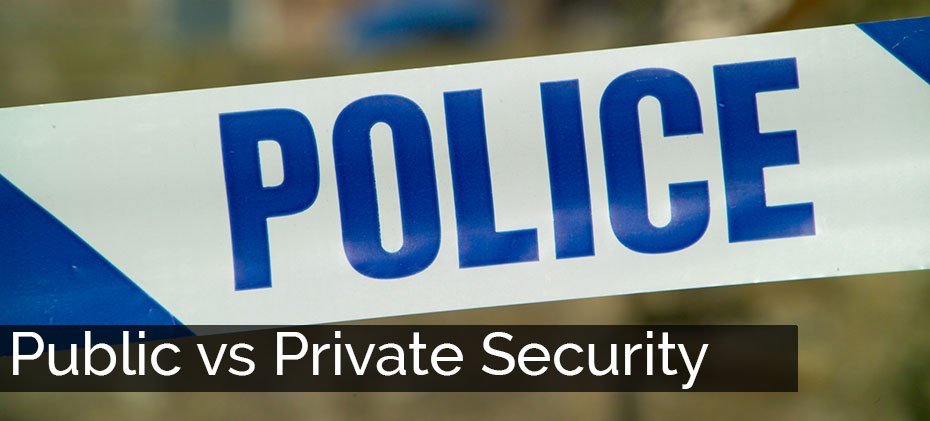Public Security vs Private Security

Public security can generally be viewed as the security provided by your city, province or country. They often work in concert to protect the rights, lives and property of the citizenry and are paid for by tax-payer dollars. Private security involves firms that are privately owned and operated, generally consisting of for-profit corporations serving the various security needs of corporate, government and individual clients. In recent years, there has been an increase in the use of private security firms to augment, and sometimes replace, traditional public security roles. That is why it is becoming increasingly difficult to clearly define the roles and responsibilities of private security and public police. This article compares the roles, responsibilities, and oversight of private security and public police.
Public security
Public security agencies are those groups that perform a security function but are funded exclusively by governments in the interest of public service. These agencies include municipal, provincial and federal police forces. Legislation in each jurisdiction initiates and empowers these agencies, mandates specific training, and creates an objective complaint review process. Police forces are granted wide sweeping powers that are generally recognized by the public, including:
- Preserving the peace;
- Preventing crimes and other offences;
- Assisting victims of crime;
- Arresting or detaining criminals, or those suspected of criminal involvement;
- Drafting, and laying criminal charges;
- Investigating crimes;
- Seizing evidence;
- Testifying in court; and
- Executing search and arrest warrants.
Police services receive their powers to search, arrest, and detain individuals from the Criminal Code of Canada and from provincial and territorial Police Acts. Police have traditionally protected public property and spaces. In the case of "mass private property" — venues that are privately owned or operated, but used extensively by the public such as indoor shopping malls, privately operated airports, and sporting arenas — owners often turn to private security to help maintain order and control access.
Private security
Private security is different than public security in several significant ways. Private security is provided to clients for a fee, and except in special circumstances, has its jurisdiction limited to the property owned by the client. Rather than service provided in the interests of the public, security is provided to protect the interests of the client. Security guards primarily maintain order and enforce regulations at public events and within establishments, protect property against theft and vandalism, provide armoured car service for transporting valuables, and control access to venues. Traditionally, legislation in Canada has recognized these differences and has not extended the same powers of detention, arrest, and search and seizure to security service providers as have been extended to police.
Private security includes measures taken by individuals, partnerships and corporations designed to protect their interests. Generally speaking, these measures involve the protection of property (such as the things produced by the client and the facilities and equipment used in its production), personnel (including both the people that work on the site and members of the public having access to it), and information about the products, property, facilities, process and so on (industrial security is rapidly becoming one of the most important aspects of private security).
Companies wishing to have private security without the costs associated with developing their own security unit will often choose to contract the services of an outside security company. By contracting the services of these agencies, a company avoids incurring the costs associated with managing and administering the function. For example, the costs associated with monitoring the performance of individual security guards, training, providing a benefit package, and so on, are avoided. These administrative and other costs are divided among all of the clients of the security firm, decreasing the cost of providing these services to any one client. Companies choosing to employ contract security also can avoid any difficulties that may be encountered through union and employee contract negotiations. These concerns remain with the owners of the private security firms.
Private security firms also operate independently of the politics of the host company. Employees may feel that they can trust a security guard from outside the company, and therefore the employee may be more cooperative during investigations than they would be if internal agents were used.
Finally, independent security companies may be able to develop expertise beyond the range of experiences usually associated with in-house security operations. Depending on the nature of the security needs of the host company, it may be more beneficial to go to the experts rather then use in-house or general contract personnel.
Training in both cases
Training for police within jurisdictions is standardized and centralized at police colleges and academies. Training for private security personnel may vary from company to company, although most provinces have, or are developing, minimum training standards. Successful police recruits are required to go through screening and training requirements to ensure that they are suitable and fit for the job. While private security personnel undergo background checks (i.e. criminal records) and training, the duration and scope is not as in-depth as that of the police.










2 comments on Public Security vs Private Security
Brooklyn Martin
Very informative!Public Security contains every trained armed officer, who is a government employ. It serves to provide security to the citizens of a country, public departments or institutions etc. The guards provided by the Public Security are given discretion to arrest any offender if necessary. On the other hand Private Security is a privately own security service and is neither run nor funded by any government department. The guards usually trained with limited skills of protecting. Their main concern is to protect whatever they are directed or ordered by their owner.
justin opiny
private security are paid minimum wage even those who did police foundation spend a lot of money on their training. they know the law and should be given a decent pay. same pay for same job is cheating. people should be paid on merit and educational standard or level